School goes South for the Spring
Host: Yougawalla Pastoral Co.
Written by Jane Sale – Manager, Yougawalla Pastoral Co.
I have found that living on a station remotely with different logistical pressures means you have to be flexible and prepared for plans to change. My dad, when he spends time here, says, “Forget about Plan B, on station it is more like Plan G or H”
I have written in the last few years about this occurring in our everyday work, but unfortunately this can also affect our children’s education. Weather, work pressures, community or family commitments have been a few of the reasons that my kids and other Kimberley School of the Air kids at times are unable to make it online or literally to their classroom. Flexibility is key for you, your home tutor, and most importantly your children, to make sure that their education does not suffer in these circumstances. As you can imagine if you are more in-tune with the traditional form of education in Australia where you walk, drive, or put your kids on public transport for the day and have them home again at night, this upheaval can be cause for a lot of worry for remote parents.
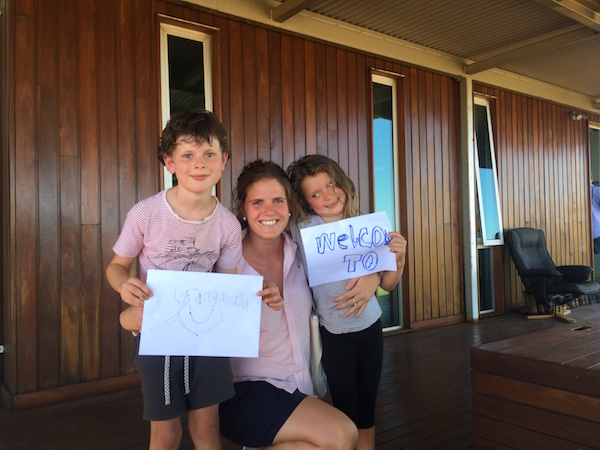 Angus and Matilda welcome their 2016 Home Tutor Madeline to the station.
Angus and Matilda welcome their 2016 Home Tutor Madeline to the station.
Although our children’s education is implemented by very caring and qualified teachers that in our case are based in Derby (a six hour car ride away) I am fortunate to employ a home tutor (traditionally called Governess) at the station to implement their education programme and communicate with the teachers via email, phone, and post.
For me very obviously this is the most important role on the station and the hardest to recruit for. There are a lot of young people that may not have the skills to apply for a job in the stock camp but think through working as a home tutor might be able to get the work outside. You can imagine that this person does not make a very focussed role model for your kids when it is hard enough to drag them inside for school. It can be tough in isolation for the Home tutor and a lot of good and not so good sides to this role. For example being around the kids all day and . . . being around the kids all day! During the week you are isolated from town but also you can be isolated from the rest of the mustering crew. It takes a very special and committed person to succeed and last the distance in this role.
Mid way through 2015 I found myself without a home tutor, smack bang in the middle of the mustering season. Grace our administration wonder woman stepped in for Term 3 and got us out of a pickle until the cattle workload eased. This set up could not be sustained however, as we needed the accounts to be managed as well. I was also concerned about going through the recruitment process and employing someone to work for only one term and into the hottest and quieter time of year. So a plan started to unfold in my head. I had the Central Station Book to work on (which can be done from anywhere and the closer to reasonable internet the better) and the kids needed schooling so I hatched a plan to head to my Dad’s place on the Mornington Peninsula in Victoria and put the kids into a Primary School for a term. I could do school drop offs and pick ups and work in between and the kids could experience a structured “normal” school environment and also get to experience team sports, tennis lessons, hip hop dance, and Milo Cricket.
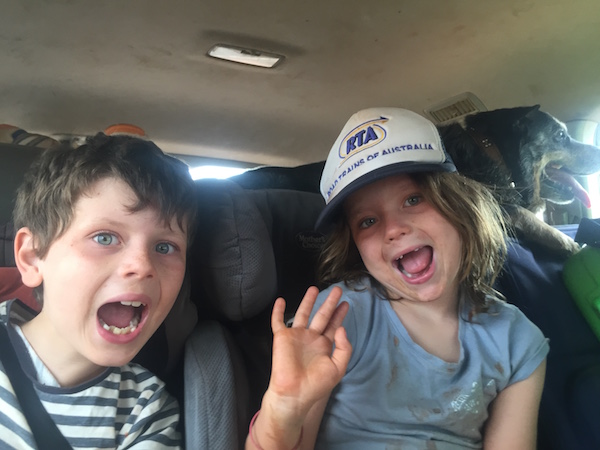 Road tripping dogs and all.
Road tripping dogs and all.
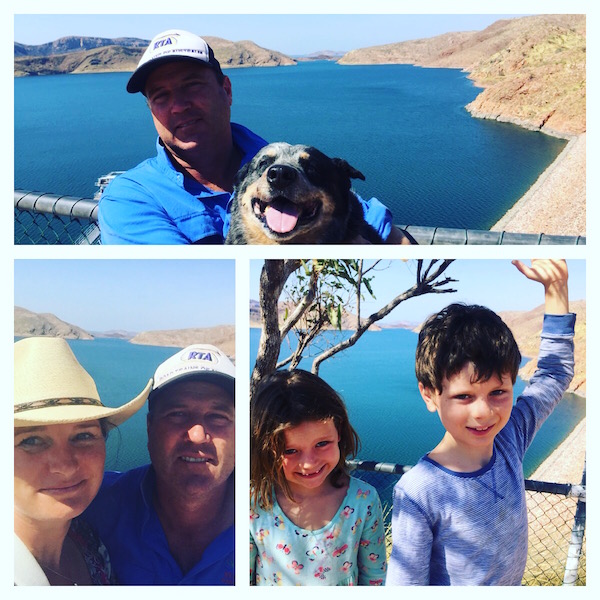 Visiting the Ord Dam near Kununurra.
Visiting the Ord Dam near Kununurra.
So, September holidays came around and we packed up two dogs, ourselves, along with cool weather gear, and headed off on a road trip through WA, NT, QLD, NSW and finally Victoria, staying most nights on a station or farm with friends that we don’t get enough time to catch up with a great opportunity that we wouldn’t have had if plans hadn’t changed!
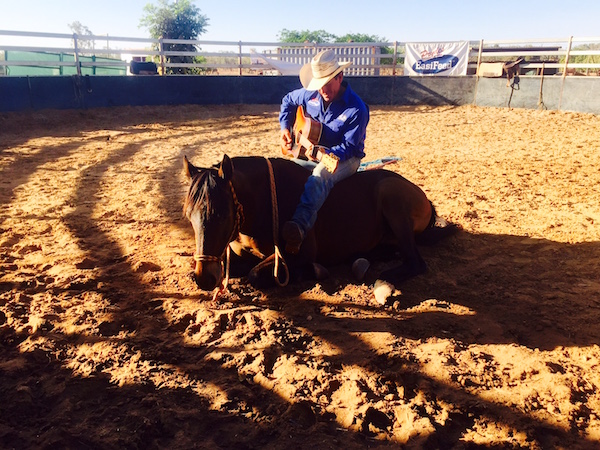 Katherine Outback Experience, NT.
Katherine Outback Experience, NT.
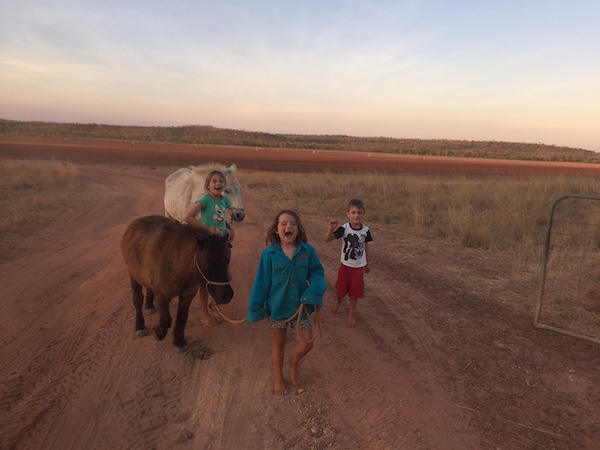 Visiting friends on the way.
Visiting friends on the way.
I have some lovely friends living down on the Peninsula from my childhood and they have kids similar ages to Gus and Tilly, even some who had been out to the station before. So it was a comfort to have familiar faces in the classroom for them. The school was so welcoming and the teachers very understanding. Going from a remote classroom with a maximum of three people including the home tutor to a school with six hundred students was a hell of a shock to their system.
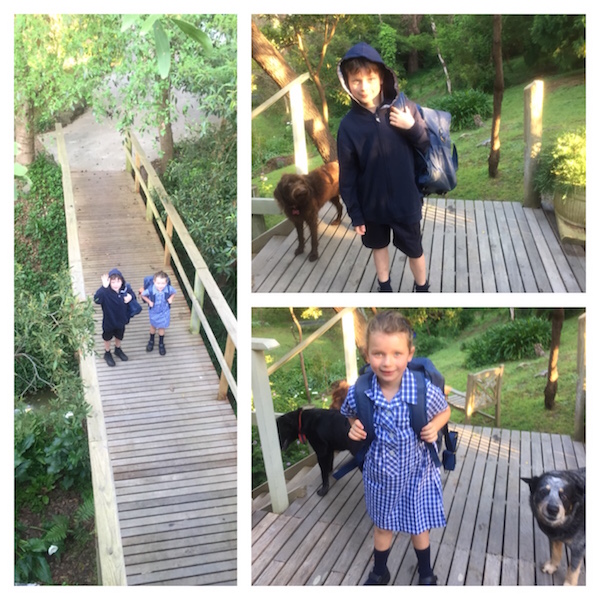 First day of school.
First day of school.
The morning of the first day we were excited and nervous – especially me and Haydn! We ended up arriving half an hour early as I didn’t even know what time normal school started. With not many kids there this early we were thinking it was not that busy. We had a wander around the grounds looking at the different playgrounds, sport facilities, veggie gardens, and artwork. Gus and Tilly were in awe. They couldn’t believe they had access to all these slides and monkey bars throughout their school day.
After meeting the Principal and a visit to the office we walked outside to 600 students running, yelling, and playing and all four of us were a bit taken aback. Tilly was more nervous than Gus and when we walked into her classroom I relayed this to the teacher who sat down with Tilly and said, “Now today Tilly I only want you to worry about one thing, I am going to tell you what the bells mean, where to put your things, where to sit, where to play, what to do, and where to eat your lunch – I only want you to worry about one thing, keeping a smile on your face.” With that, the worry lines faded from hers and my face and a smile appeared on her and her couple of tears were wiped away.
When we went to meet his class, Gus was asked what was different to home life and he said at home he was able to ride his motorbike down the middle of the road and if he did it here he would likely get arrested. This gave everyone a giggle and we left him surrounded by his classmates and teacher asking him a million questions about home back in the Kimberley.
My Dad did the school drop off quite a bit and told me after one occasion that Gus was early and one of his classmates asked him to come to the courts to play kick to kick. Gus looked hesitant and the teacher told him she would look after his school bag. As Gus walked towards the courts with his Grandad he said “Poppy but I don’t know the rules” and Poppy replied, “Gus there are two rules – he kicks the ball to you and you kick it back. You’ll work the rest out” and with that Gus ran off with his new friend. Sport at school was a huge part of Haydn and my childhoods and this side of isolated life has always worried me that our kids were missing out, so it was great for the kids to play and learn the rules of not only the different sports but fair play and competition is a huge life lesson also.
In the first couple of weeks Tilly had an excursion to a nature reserve and they were shown some Aboriginal rock art and talked about bush tucker and how the aboriginals did their hunting and gathering. Tilly was so excited to be able to tell the class about her Aboriginal friends that had shown her art and how to draw and also collect bush tucker and bush medicine that she uses for her eczema. The teacher later told me that she had one little boy that was constantly by Tilly’s side hanging on every word and later said to his own mother who was a teacher at the school, that he loved everything outback and wanted to be an Aboriginal when he grew up.
Gus’ class was focussing on the science of communication for the term. Angus and I offered to present to the class about how we built and set up the station for these services including power, phone, and internet. We showed a slideshow of our station life and of most services. We talked about communication being mainly via satellite and solar power and then through Kimberley school of the Air’s involvement, got online with the science class in the virtual classroom so Angus’ Victorian class mates were able to see how he usually attended school. There was so much interest and questions both to the KSOTA teacher online and to Gus. Most questions directed to Gus from the boys in his class were to do with his Dad flying a helicopter to muster cattle and when I left him in the lunch break he was swamped by students and said later he felt like a Rockstar.
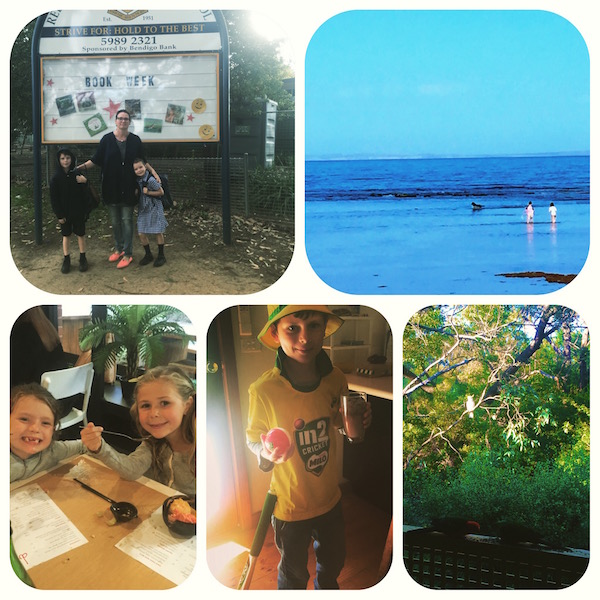 The spoils of seaside school life in the south.
The spoils of seaside school life in the south.
It wasn’t all smooth sailing. After the first few weeks the novelty wore off a bit and I had a lot of persuading to get them to do their homework and through the school gate on a few mornings. They were faced with some minor school yard bullying and befriending and de-friending, this was an important part of the learning experience for them and for me – good and bad things that they haven’t experienced in schooling in the middle of nowhere.
What a wonderful life they have to be able to experience these very different lifestyles. The teacher said to me at the end of the school year that what could have been a disruptive process for Gus and Tilly as well as their classmates, actually added value for them all, especially in their practical learning experiences. I was so proud of their adaptability. It seems they have become used to having to run with Plan G too.
